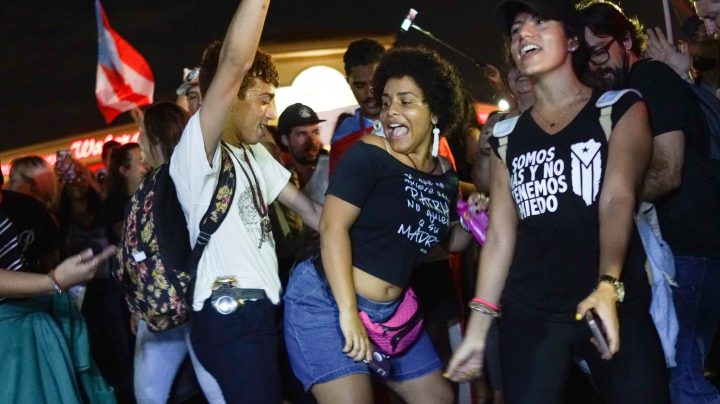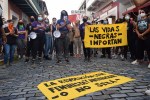People Are Using #AquíNoExisteElRacismoPero to Get Real About Racist Experiences in Puerto Rico & Beyond

Protesters dance in the street during an anti-government demonstration in front of the Department of Justice on July 29, 2019 in San Juan, Puerto Rico. Photo by Angel Valentin/Getty Images
On June 9, news broke that a couple with three children in the northeastern municipality of Canóvanas, Puerto Rico had been enduring racist attacks by a neighbor since the family moved in last October. Their cistern was allegedly marked with words that roughly translate to “they smell” next to an image of a Black adult and child; similar, racist caricatures hung from the neighbor’s balcony.
This unsettling incident is not the only racist story in Puerto Rico’s modern history. Recently, racist and transphobic tweets by Alexis Zárraga, a popular influencer on the island and instances of blackface perpetuated by a comedian on his popular Telemundo show resurfaced.
In 2017, an 11-year-old girl, Alma Yadira Cruz, was bullied at school by fellow students who regularly spewed racial slurs. In an ensuing altercation, the school’s principal called the police; Yadira Cruz was arrested and charged with five counts of aggression. The case has since been withdrawn. Carlos Riviera Santiago was the Assistant Secretary of Minors and Families to the Department of Justice at the time. Governor Wanda Vázquez (former Secretary of Justice) recently appointed Santiago as the government’s new Secretary of Labor and Human Resources.
These are just a few of the publicly reported instances of racism. There are many more—most of which never get any press. Black people in Puerto Rico—which also includes many Dominicans—are tired of the timeworn argument that African heritage precludes a person from racism. Over the past few weeks, many have shared personal stories of racism using #AquíNoExisteElRacismoPero (racism doesn’t exist here, but)—a hashtag that directly addresses that falsehood.

“When I go to restaurants [in Puerto Rico] they speak to me in English, thinking I’m not boricua,” one person wrote. “Living in Philly, Boricuas told me I didn’t look like I was from Puerto Rico.”
“I’ve been told I’m “Black” but not “Black-Black” like the “ghetto” Black people in the U.S.” another wrote. “When I went to New York last year, getting off the plane I was told to be careful so that ‘the Blacks don’t kill me.’”
“In high school, I once had a massive crush on a girl in my class. She finally wrote to me, and we had a little relationship for a couple weeks,” another chimed in. “Then one day she comes to me and says she can’t continue this kind of relationship with me because “her family won’t allow her to be with a Black guy.”

Those are just a few of many examples. Race in Puerto Rico (and Latin America) is complex. It’s likely that a majority of Puerto Ricans can count African-born people in their lineage being that, during the Spanish occupation especially, the island was very much a part of the slave trade. Puerto Ricans are also descendants of Indigenous Taínos and Spanish Europeans.
From childhood, people on the island are taught that Puerto Ricans “are a mix of the three races,” write Ana Teresa Solá Riviere and Luis D. Alfaro Pérez in an op-ed for Pulso Estudiantil, a publication of the University of Puerto Rico at Río Piedras. The result is the “[indoctrination of] generations with the affirmation that we all come from the same genetic background was key in promoting the false postulate that ‘in Puerto Rico, there is no racism because we’re all the same; I’m as Black as you.’” This inaccurately presents a peacefully blended society—erasing the violent history of Africans enslaved in Puerto Rico and ignoring its effects that still reverberate today.
But, when talking about racism, the actual lived experience of the person in question is what matters. The societal privilege someone is afforded is directly impacted by their own specific presentation. Many Puerto Ricans are considered “white-passing”—they are not visibly Black and thus do not experience the same oppressions, aggressions and prejudices a Black person does.

In response to this fact, people will oftentimes conflate racism with discrimination. That racism against Black people exists in Latinx culture does not negate other kinds of discrimination Latinx people face, be it for speaking Spanish in the U.S., being LGBTQIA+ anywhere, neurodiversity or difference of ability, or anything else that separates them from the able-bodied, cishet-male-status-quo. Calling attention to other kinds of discrimination in our current zeitgeist, however, detracts from the specific focus on stopping anti-Black racism.
Right now, Colectivo Ilé is leading the anti-racist movement in Puerto Rico, as is the Afro-feminist publication Revista étnica; both are vital sources for anyone looking to better understand systemic racism in Puerto Rico. We encourage you to explore #AquíNoExisteElracismoPero, too.
When Black people speak about racism, listen.
